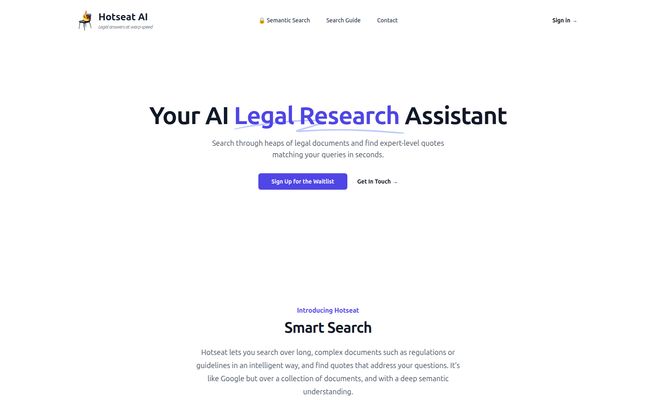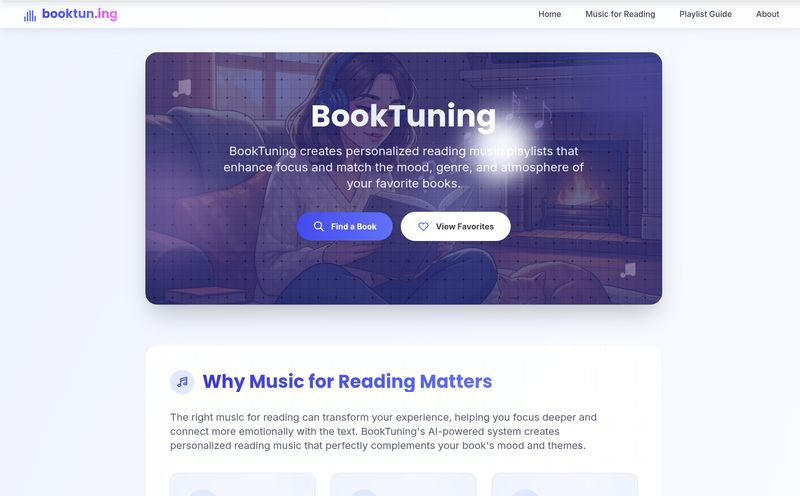As someone who lives and breathes SEO and digital traffic, my relationship with legal documents is… complicated. I still get a cold sweat thinking about the great GDPR scramble of 2018. We all do, right? Hours spent trying to decipher legalese that felt intentionally confusing, wondering if our cookie banners were compliant enough. It was a mess. These massive regulations—the Digital Services Act, the Digital Markets Act, and now the big one, the EU AI Act—are like un-climbable mountains of text for most of us.
So, when I hear about a new tool that promises to act as a sherpa for this very climb, my ears perk up. The tool in question is Hotseat AI, and it’s not just another CTRL+F search bar. It bills itself as an "AI Legal Research Assistant," and after getting a peek at what it's building, I have to say, I'm intrigued.
So What Is Hotseat AI, Really?
Imagine you could hire a junior legal associate who has already read the entire 226-page EU AI Act, remembers every clause, and can answer your plain-English questions with direct quotes from the text. That’s the core idea behind Hotseat. It’s an AI-powered Q&A service built specifically to tackle these dense European regulations.
This isn't just keyword searching. The team behind it talks about "whole-document reasoning." That means the AI tries to understand the context of your question and the document as a whole to give you a genuinely useful answer, not just a list of sentences containing your search term. It's the difference between asking a librarian "where's the section on data processing?" and asking "am I allowed to process user data for marketing if they've only signed up for my newsletter?" One gives you a location, the other gives you an answer. That's a pretty big step up.

Visit Hotseat AI
Tackling the EU's Digital Maze
The initial focus for Hotseat is the beast of EU regulation. And thank goodness for that. The AI Act, the DSA, the DMA, GDPR... these aren't just suggestions. They have real teeth and can have a massive impact on how we build products, market services, and handle data. For any company operating in or serving the EU, staying compliant is non-negotiable, but it’s also a huge resource drain.
Manually sifting through these documents is a special kind of torture. They’re not written for normal humans. They’re written by lawyers, for lawyers. Hotseat aims to be the translator, the bridge between impenetrable legal text and the practical questions a product manager, marketer, or startup founder might have. This focus on a specific, painful problem is smart. Instead of trying to be an AI that does everything, it's aiming to be the absolute best at one very difficult thing.
The Features That Actually Matter
Scouring their site, a few things stood out to me as genuinely useful, not just marketing fluff.
Smart Search and Its Big Brother, Pro Search
The standard search is called "Smart Search," and it’s designed to be fast and intuitive. But the real power seems to be in what they call "Pro Search." They mention it allows for "complex instruction following" but is slower and more expensive. This tells me they’re running two different models or processes. The fast one for quick lookups, and a more powerful, resource-intensive one for when you need to ask a multi-layered question. I can see the use case immediately: a quick search for a definition, versus a pro search for a complex query like, "Summarize all obligations for a 'high-risk AI system' under the AI Act concerning data governance and record-keeping."
Metadata Extraction Is a Quiet Superstar
As an SEO, I have a deep appreciation for metadata. It’s the context that gives information its meaning. Hotseat automatically extracts things like publication dates and sources for the information it finds. In the legal world, this is critical. Is this guidance from a 2019 draft or the final 2023 text? Knowing the source and vintage of a legal quote is everything, and building that in from the start is a very good sign.
A Community-Powered FAQ
One of the more interesting tidbits is the mention of a collaborative FAQ. Users can post questions and see public answers. This could turn into a fantastic, crowd-sourced knowledge base over time. If I have a question, chances are someone else has already asked it. This could save a ton of time and, dare I say it, foster a bit of a community around deciphering these complex laws together. A support group for the legally bewildered, maybe?
Looking Down the Road
Hotseat is upfront that it’s still in its early days (private beta, to be exact), but its roadmap has a couple of features that could be genuine game-changers.
First, the ability to upload and search over private documents. Think about it: uploading all your company's internal privacy policies, client contracts, or ISO compliance documents and being able to query them in the same way you query the GDPR. That’s huge. It turns the tool from a public research assistant into a private, internal compliance engine.
Second, they plan to add machine translation for non-English documents. Given the multilingual nature of the EU, this is a necessity. It would open up a world of national-level regulations that are currently inaccessible to many English-speaking teams.
The Good, The Bad, and The Beta
So, let's get down to it. No tool is perfect, especially one that's not even public yet. From what I can see, the biggest strength of Hotseat is its sharp, almost painful focus. It's not trying to boil the ocean. It’s trying to solve the very specific headache of EU tech regulation, and that’s a big enough headache to warrant a dedicated solution. The speed and accuracy it promises, combined with the contextual metadata, could make it an indispensable tool.
On the flip side, the limitations are pretty clear. It's in private beta, so you and I can't just sign up and start using it today. Its current focus is almost entirely on EU regulations, so if your main concerns are with CCPA in California or other international laws, this isn't for you... yet. And the Pro search being "slower and more expensive" is something to keep an eye on. How expensive is expensive? That will be a major factor in its adoption.
Who Is This Tool Really For?
In my opinion, this isn’t just for corporate lawyers in tall glass buildings. I see a few key groups getting a lot out of this:
- Startup Founders & Solopreneurs: People who don't have a legal team on retainer but need to be compliant from day one.
- Product Managers & Engineers: The ones building the tech who need to understand the rules of the road without reading 200 pages of legislation.
- Compliance Officers: For them, this could be a force multiplier, helping them find answers and evidence of compliance much faster.
- Marketers & SEOs (like me!): Anyone who handles user data or operates in the digital space needs to understand the boundaries set by laws like GDPR and the DSA.
What About the Price Tag?
This is the million-euro question, isn't it? As of right now, there is no public pricing. The site prompts you to "Sign up for the waitlist" to get notified when it launches. This is typical for a product in private beta.
If I had to guess, I'd imagine a tiered model. Perhaps a free or low-cost tier for very limited, fast searches, and then professional tiers based on the number of users or the volume of "Pro Search" queries. For a tool this specialized, it won't be cheap, but it will be measured against the cost of a lawyer's time or the even higher cost of non-compliance fines. It just needs to provide more value than it costs.
Frequently Asked Questions
What exactly is Hotseat AI?
Hotseat AI is an artificial intelligence-powered Q&A tool designed to help people get clear answers from complex legal documents, with an initial focus on major EU regulations like the AI Act and GDPR.
Is Hotseat AI a replacement for a lawyer?
No, and the company is very clear about this. Their website includes a disclaimer: "Think of Hotseat AI as a powerful legal research tool. If you need legal advice, take answers from here as a conversation starter with a lawyer." It's a tool to make research faster and more efficient, not to provide legal advice.
What specific regulations does it cover?
It's built to handle the EU's AI Act, the Digital Services Act (DSA), the Digital Markets Act (DMA), and GDPR, along with other related European guidelines.
How can I try Hotseat AI?
Currently, Hotseat AI is in a private beta, which means it's not open to the public yet. You can visit their website to sign up for the waitlist and be notified when it launches.
Is this only useful for legal professionals?
Definitly not. It's designed for anyone who needs to understand these regulations, including tech founders, product managers, compliance officers, and digital marketers who need to ensure their work is compliant.
What is the difference between Fast and Pro search?
Fast search is for quick, simple queries and delivers rapid results. Pro search is for more complex, instruction-based questions that require deeper analysis of the documents. Pro search is more powerful but is also slower and expected to be more costly.
My Final Take: Is It Worth Watching?
Absolutely, yes. We're drowning in complex information, and tools that help us make sense of it are always welcome. The problem Hotseat is tackling is real, it's expensive, and it's not going away. By focusing so tightly on EU tech law, they have a chance to build something uniquely powerful and useful.
Of course, the proof will be in the pudding. How accurate is it really? What will the pricing look like? Will the user experience be as smooth as the concept? These are all open questions. But for now, Hotseat AI is firmly on my radar. I’ve signed up for the waitlist, and I suggest you do too if you’ve ever found yourself lost in the desert of a legal document.
References and Sources
- Hotseat AI Official Website: hotseatai.com
- Official Text of the EU AI Act (EUR-Lex): eur-lex.europa.eu



